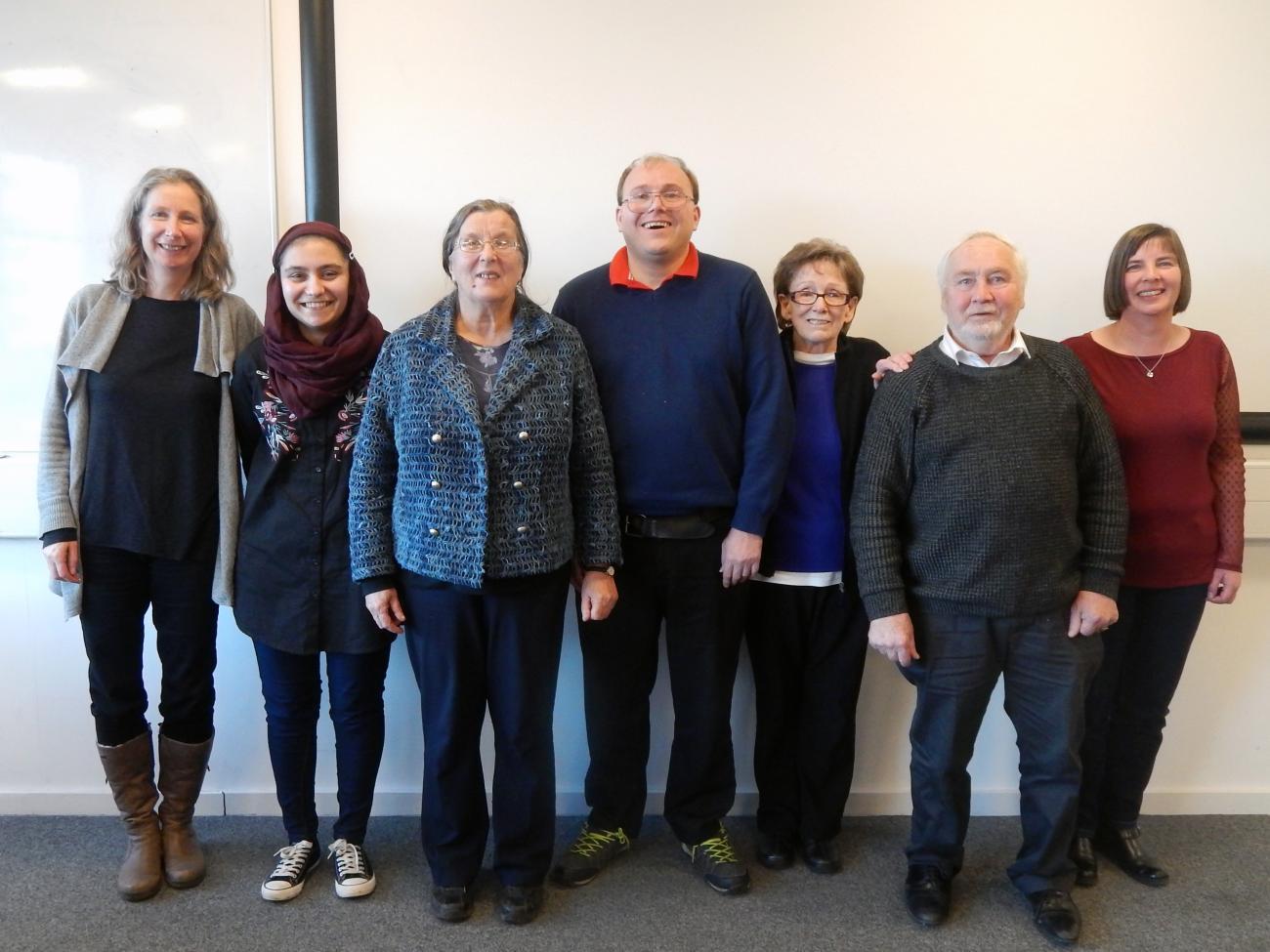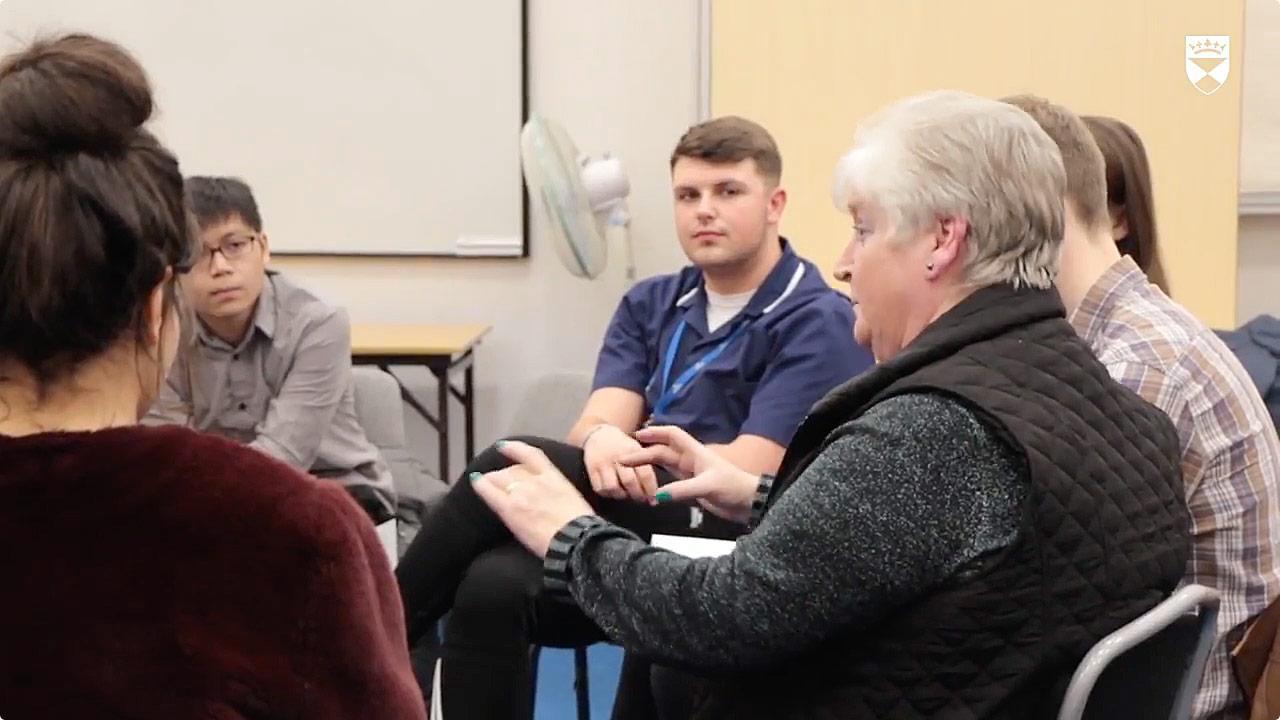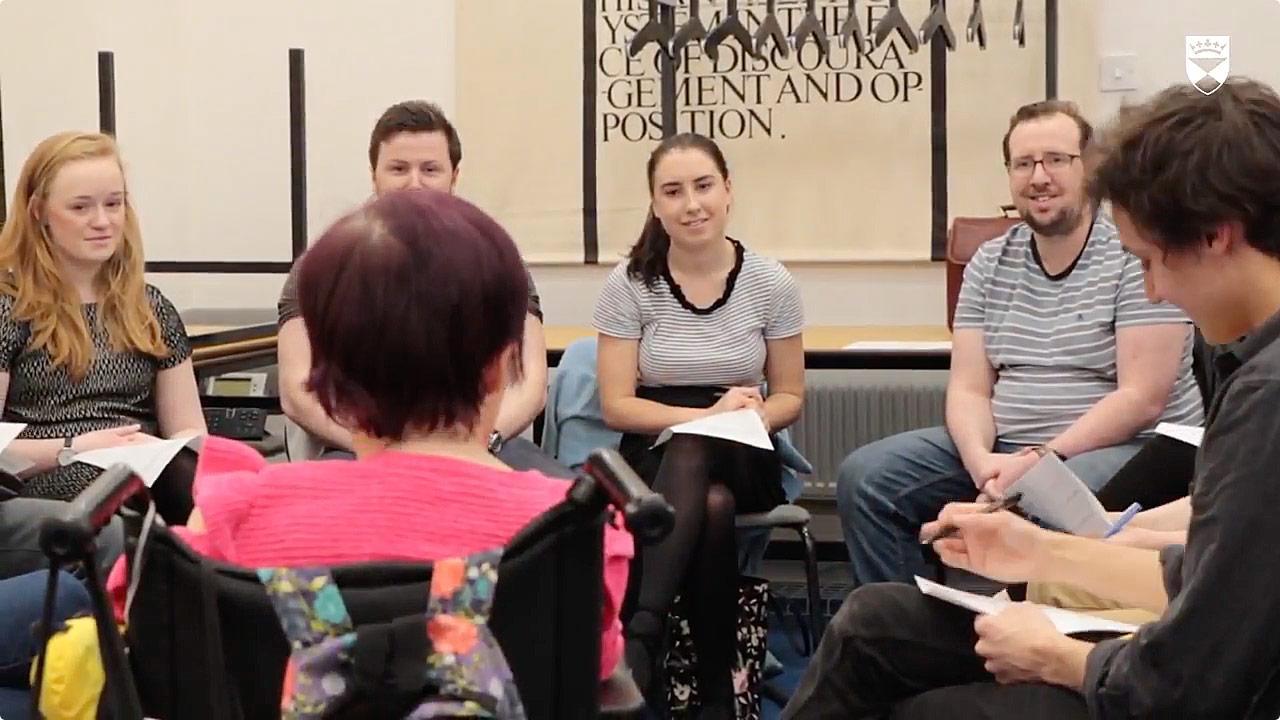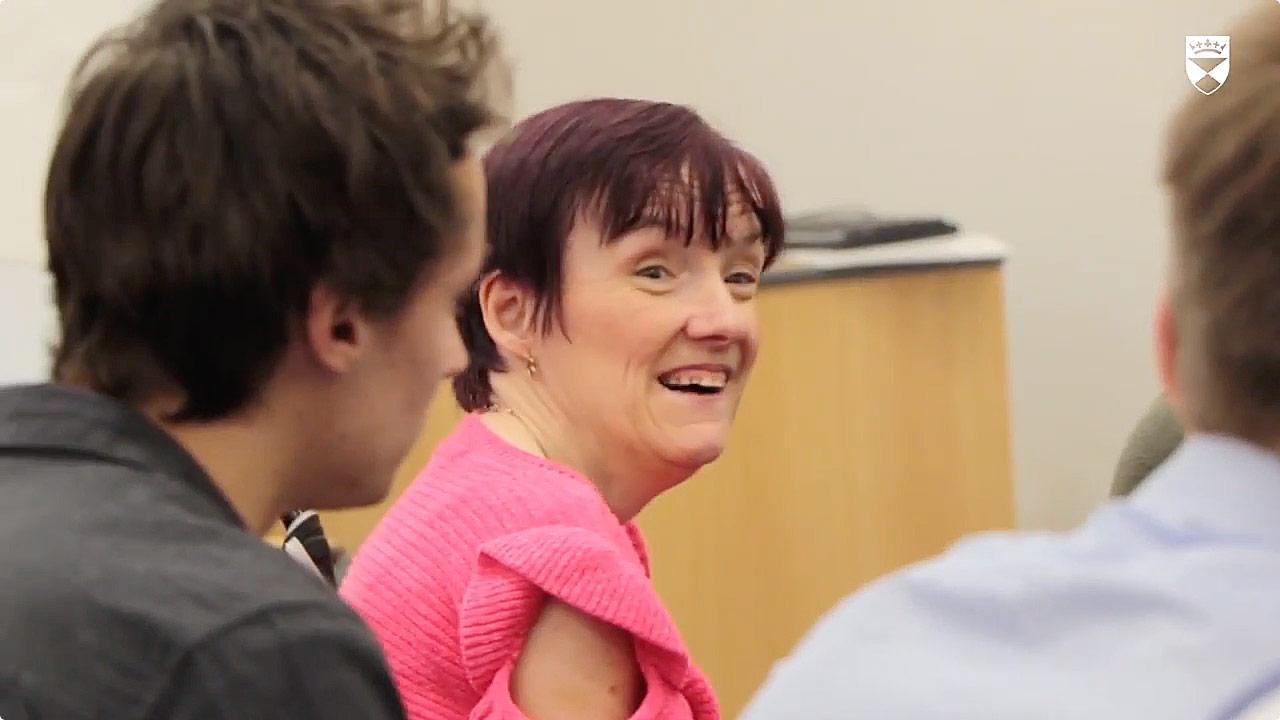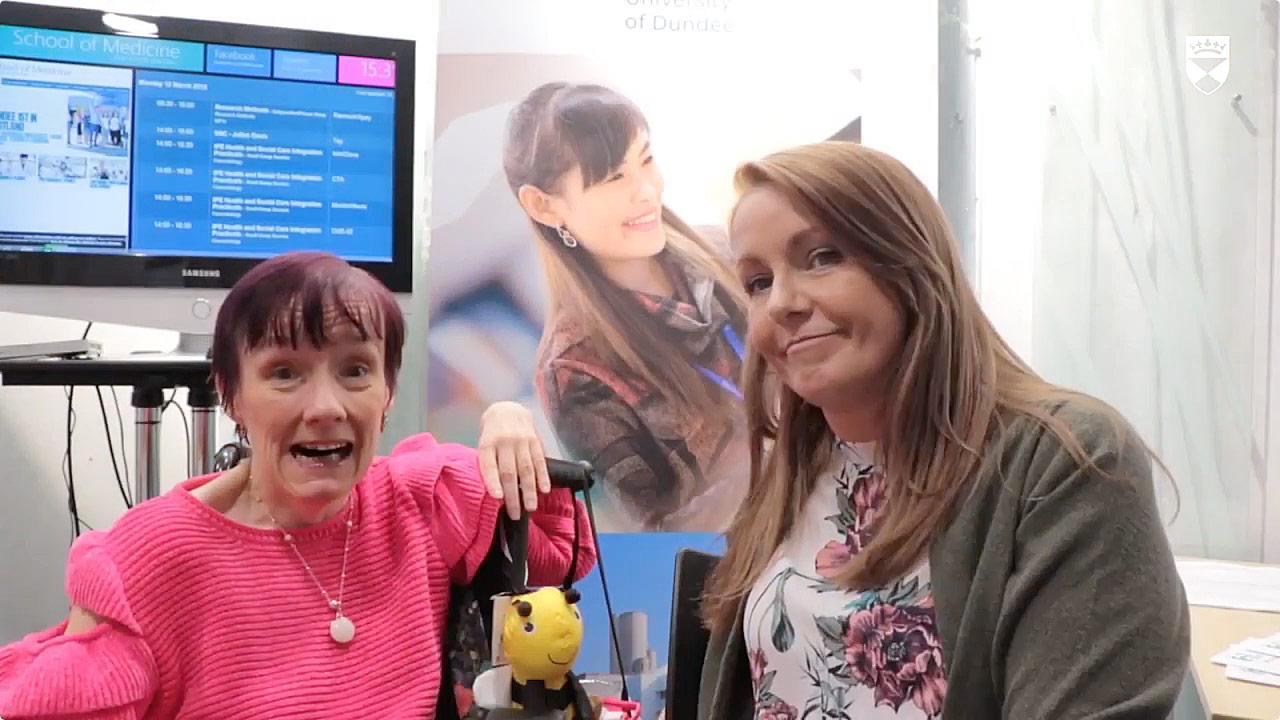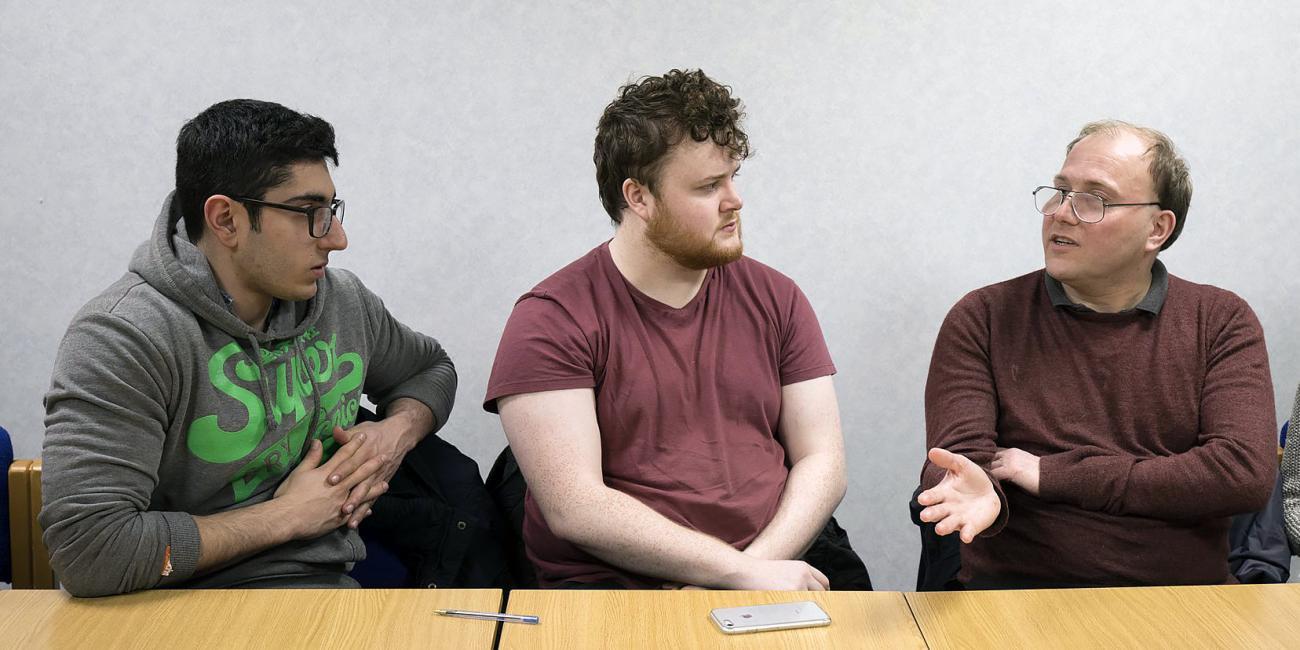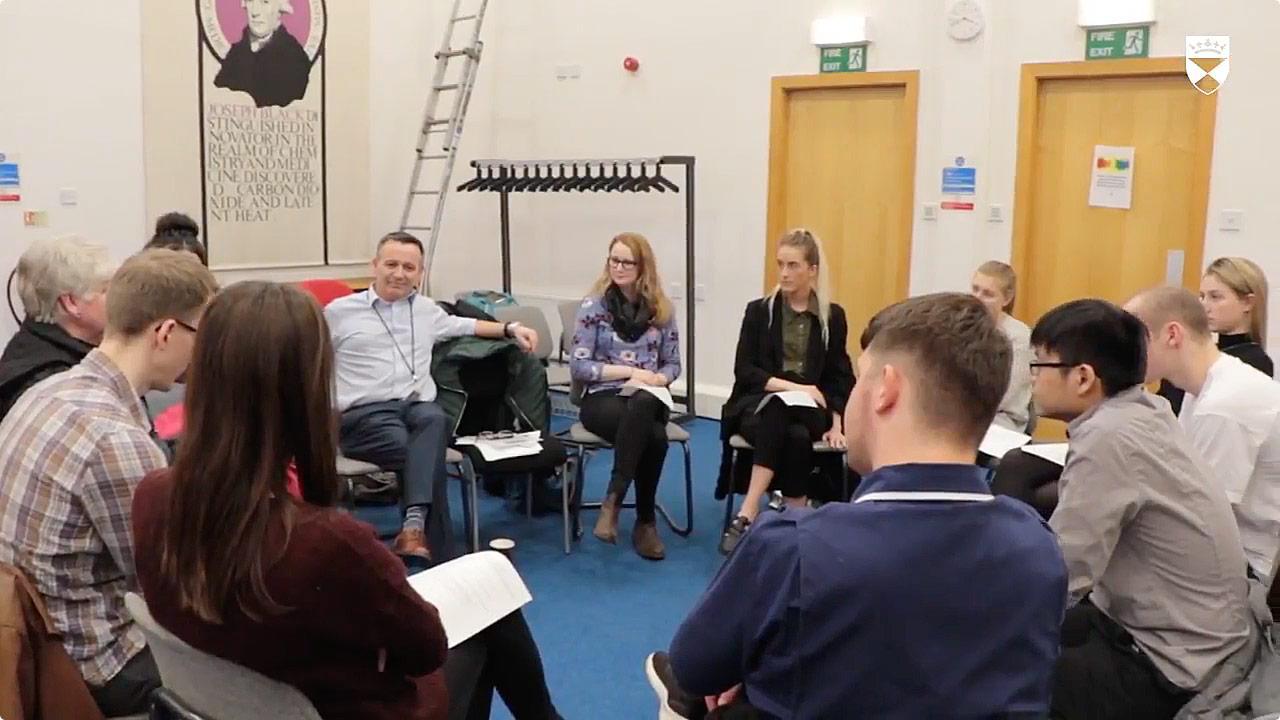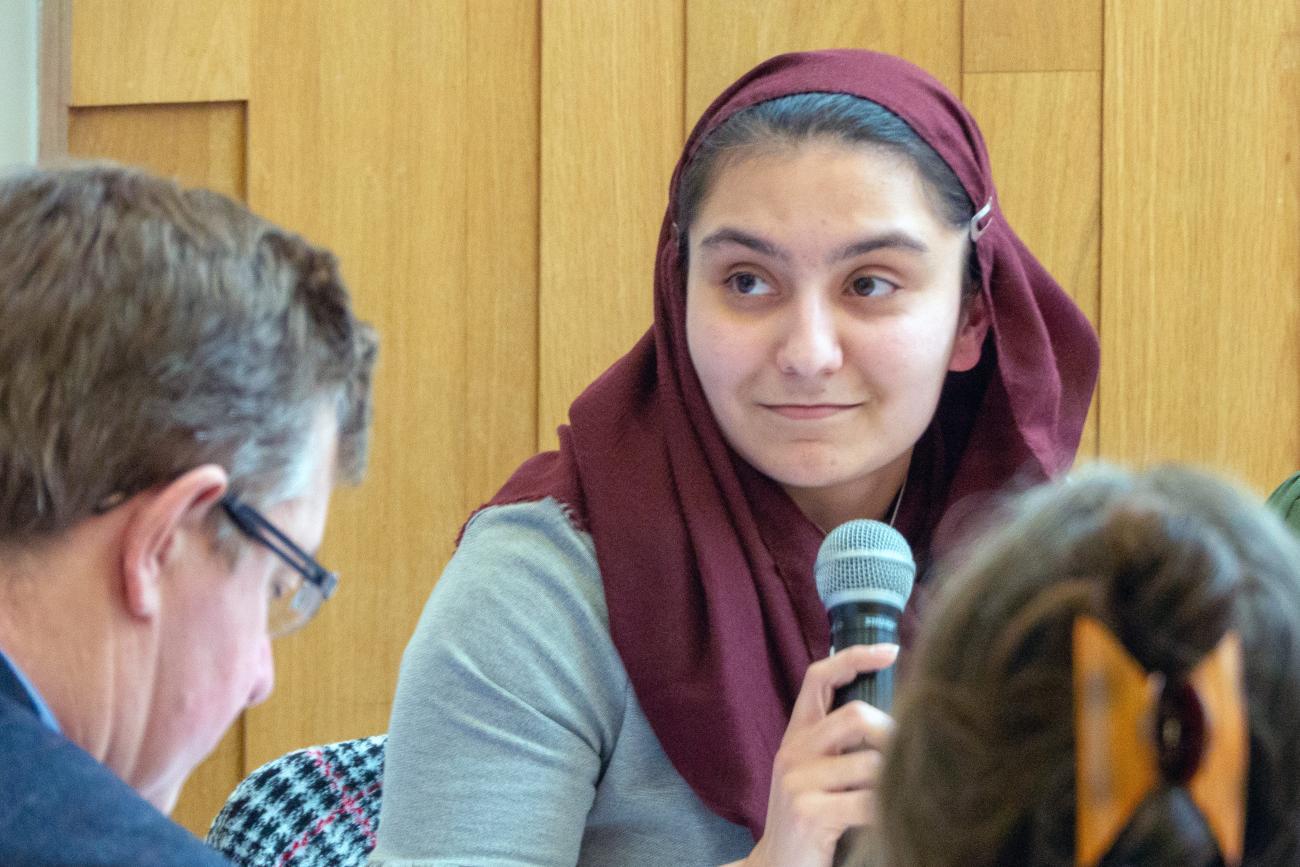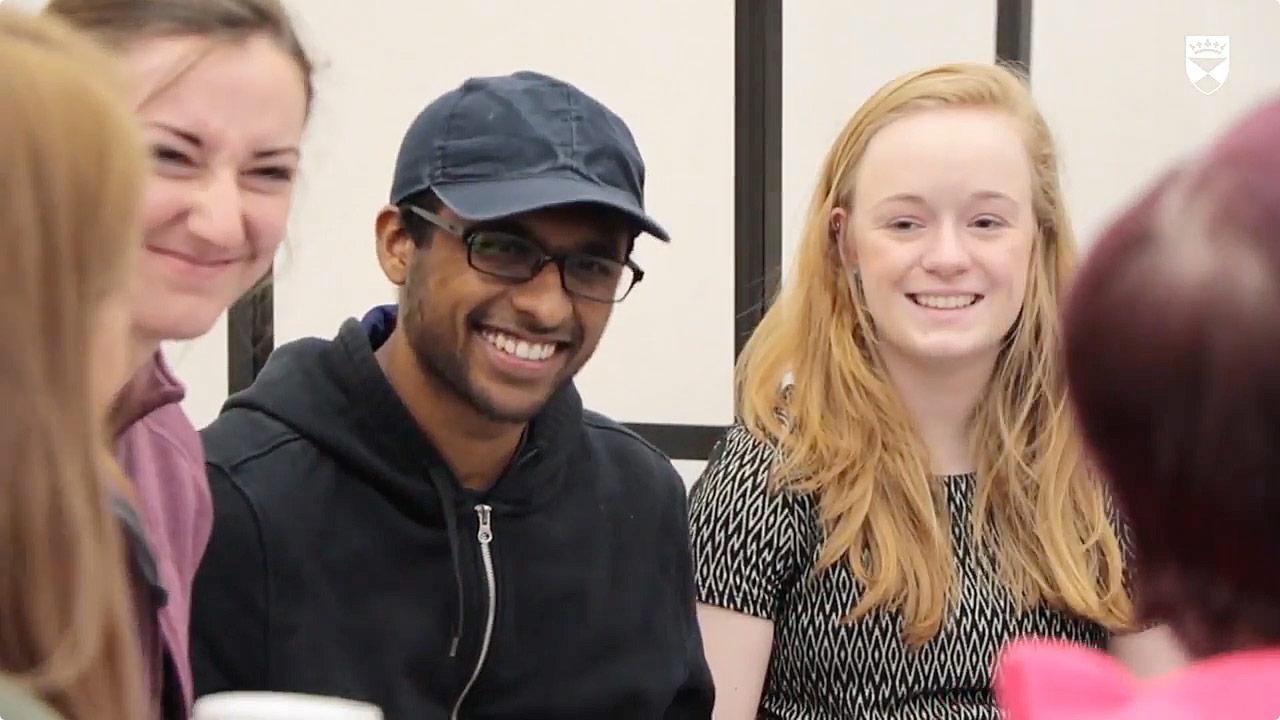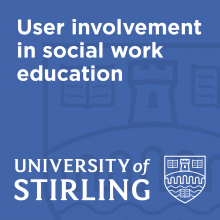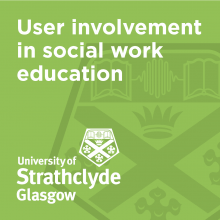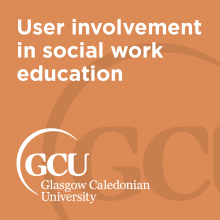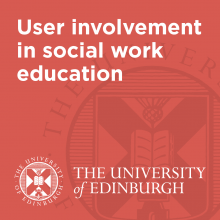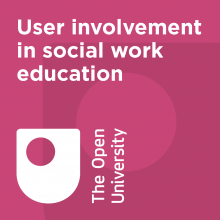This is one of seven stories, showcasing what service user and carer (SUAC) involvement in social work education looks like, what makes it work and what benefits it brings. It has a significant role to play in shaping the next generation of practitioners.
SUAC involvement in social work education has been mandatory for 15 years now, so there is a lot of learning to share with others who can learn from this - transferrable to educators and practitioners working across public services, and relevant to policy-makers committed to mainstreaming person-centred – or person-led – approaches based on real partnership working between those who use and those who deliver services.
Introduction
What is unique about this project, or these inter-professional education sessions, was that it was involving not only social work students but students from medicine, from nursing, from pharmacy, and other health aligned professions including OT's. So that was a very unique opportunity, to bring a whole range of students together and start to address some of the issues around health and social care integration - of the requirement of working much more inter-professionally when the students graduate and are in practice, but to embed that into their training as well.
Susan Levy, Senior lecturer in the School of Education and Social Work
Four afternoon sessions were run over a week involving around 200 students in total. Students were drawn from a range of health and social care disciplines and from the Universities of Dundee, Abertay and Robert Gordon.
During the afternoon, they worked together in small inter-disciplinary groups of around six, with opportunities to hear from and ask questions of a service user or carer about their experiences, good and bad. Students were asked to think about and feedback what could be improved in these discussions.
Several of those sharing their experiences at these sessions came from the University of Dundee's well-established service users and carers (CU) group, who input to the BA and MSc Social Work programmes.
This story is told by many of those service users and carers, and is based on evaluation feedback from students participating on the day and interviews with two social work students.
This story outlines:
- Why service users and carers think this matters, and what they hope for
- What students got out of these sessions
- Reflections on the sessions, and what they revealed about different health and social care students' knowledge and understandings of person-centred care.
The inter-professional education sessions have since been repeated, with this established as an annual learning opportunity.
Why this matters: why service users and carers got involved
Sharing our life experiences/putting something back
Service users and carers were clearly driven by the desire to make a difference to peoples' lives, sharing their experiences to educate the next generation of health and social care workers to do better. While some recounted good experiences, it is what is not right in the system or in practice that motivates them.
We must get together and convince if nothing else, students the importance of listening so that tragedies don't happen … These happened because people didn't listen to each other … and these can't be reversed now, these are tragedies.
It is also about 'putting something back' and using their experiences constructively.
'I think one of the important things is we've so much experience of living a life, where you're depending on services and you're hopeful that people are going to … the professionals are going to help you... We can give it from a different angle, we can give it from the real life situation … and not just be taken for granted and token gestures and ticking boxes. We can give so much life experience and I think that's the key as far as I'm concerned.'
... it wasn't about doing anything except putting something back, through my experience in life, to help them become, hopefully, better social workers … more professional and more understanding and more empathetic.
They spoke continuously about professionals ' choosing not to listen' or 'having their lugs painted on!' Participating in sessions like these ones helps them deal with these frustrations, and they take great pleasure and comfort from the fact that students are listening, 'receptive and willing to learn.' Based on the evaluation forms that 29 service user and carers completed after the sessions, 90% 'strongly agreed' that students listened and 86% that they understood their story. The rest 'agreed.'
One CU Group member described how she was nearly in tears at one of the learning sessions: ' cos they picked up exactly what I was going through and you can't put words into that. …and it turned out as far as I was concerned that particular student had totally understood my life and that means that I have imparted something that they'll maybe not forget and give them a lesson in life.'
Not being heard amounts to not feeling valued, explained members of the CU Group. It can be a path to mental ill health, and the use of antidepressants could be avoided, they reckoned, 'if only they listened!'
… if you are not listened to as a carer, it really begins to impact on your life. Your health suffers. You begin to not sleep at night, you begin going about in a daze, you begin to feel depressed – and that makes it more difficult to support the person you're supporting. That's not fair to them.
Ultimately:
We're tired of being treated badly, we're tired of fighting to get people to help us to be treated better but we have to keep going 'til our dying day so at least we can turn back and say, well I tried.
But service users and carers have many identities. Terri has been involved as a member of the CU Group, but is also a student on Dundee's BA Social Work programme. Her reasons for wanting to become a social worker are illuminating:
….my purpose for going in to do social work in the first place was after being a kinship carer for my nephew who was severely autistic, and because we had to constantly fight to get services in place for him and education and just in his life in general. It was really difficult. So through that I kind of took a passion to advocate for him and then through advocating and eventually getting the support in that that he needed, I kind of decided to go down the route of social work … and that's kind of where I am now, and I am still really passionate about it. I still think that services are not there for those who need them best. I still think that service user's voices aren't heard as good as they should be.
Kinship
The University of Dundee CU Group members clearly feel great kinship with one another, and draw comfort and support from the other group members. This keeps them returning to the group - and contributing to sessions like the inter-professional one.
As one remarked:
Hopefully that helps you, to even talking about it … people are listening here.
That's why I come along to the (CU Group) meetings because the first meeting that I came to was at the Opex (Hotel). It was a coffee something and it was E that got me to come along to the meeting and I was so surprised and astonished that everybody that was there all told the same story. Every carer that was there, every service user that could speak that was there all told the same story ….
Moving into practice
However, while service users and carers are passionate and optimistic about the difference they can make by educating future health and social care professionals, they recognise wider challenges, and cultural context.
Some 'are fearful' for students when they qualify, worried that they will be 'swallowed up by the system' and 'come up against people who have been trained differently.' One of them articulated it this way:
You are forced, so many ways to go along with what people are saying because if you don't, what happens is you step outside the circle. You're in the circle, in the herd. You step outside that circle and you're treated differently.
Commented another service user:
What we're needing to do is … get the management in here, get to the government and make the social workers, the ones that are learnt by the older system, get them in here and let us tell them the way they've treated you.
Terri also expressed concern that she isn't going to get to be the kind of social worker she wants to be, particularly in the statutory sector with, what she sees, as a focus on assessments and too little time for people.
Having almost graduated now I'm like, I don't feel that I'm going to get to do the work that I would like to do with people, because I prefer working with people rather than signposting people to go and work with other people.
The CU Group members also feel the need for greater accountability in the 'real world.'
Nobody seems to think well they've been doing that for a year, two years and has it made a difference? Nobody seems to ask, have these things made a difference and they don't look at the whole person and say 'Well all the different professions and their input has that made a difference? Should we be doing something else?' That just doesn't happen, so I think that's another reason why it's important, that if you start working with the service user and the carer first and what they're saying, rather than just coming along and going through a series of tick boxes - which must be very frustrating, I'm sure for the people themselves, the workers - then things have to, you know, change.
Some of the stories…
The experiences the service users and carers shared with students on the day were not captured. However, CU Group members, who told their stories at the event, have given permission for some of these to be shared here. They are particularly valuable in highlighting what needs to change and real challenges for effective inter-professional working and health and social care integration.
They all believe it's so important that these stories are told, 'not swept under the carpet.' Because ' it's not just one or two instances, it would appear.' 'Absolutely not… it's endemic' the others say.
Thanks to all of them for being so frank and courageous in sharing their stories.
Key themes
Communication
You know, it doesn't matter where you go or who you sit down and talk to, whether it's your lecturers, other students, professionals, service users, carers, they all say the same thing, it comes back to communication.
social work student at the inter-professional session
Effective communication is clearly at the heart of all of this, based on the evaluation forms completed by students attending as to what they learned from the session.
This is inclusive of building rapport and developing relationships with service users and carers; to working with whole families and those around them; to supporting different individuals to express themselves, understanding their world holistically and what matters to them. (For some, this was also their first opportunity to engage with people with learning disabilities and more complex communications needs.) Others highlighted the importance of body language, truly listening, being honest (and acknowledging mistakes) and communicating across and between different services.
On this last point, a service user/carer remarked:
… another reason why I got involved that a lot of people are working independently and some people are working in a very positive way, really understanding what's going on, and somebody else comes along, another profession, who then undermines without realising it … and so everything goes haywire. I think if there's far more speaking between the professions and with the service user and carer that's what we need.
Not seeing past the service
The CU group members talked repeatedly about professionals 'not seeing past the service,' sometimes feeling that people are just in it for the pay packet, and in too much of a rush.
I think all they can see is the job that they're doing and all they can see is what they've got to get done in that day but they don't see the bit about caring about that person and if that person needs a wee bit more of their time like half an hour of their time, it's 'no hurry up, I've got to get out here.' It's 'I've got an extra half hour, I can spend that with you. You tell me what's happening and I'll try and help you.' But we don't get that, that's it … you've got that allotted time and … they don't seem to see past this service.
Another expressed:
I've seen what happens in the past with CPN's (community psychiatric nurse) and social workers and how they got a bad reputation and experienced it myself and seen that they were going through the motions. They were getting paid that was it, it seems to be that it was the money was more important than the person was and that's the feeling I got. And you feel isolated and you feel alone and unable to communicate to that person cos if you can't communicate with the people who're dealing with your illness it puts you backwards…
Not seeing people as individuals
Related to this, service users and carers talk about not feeling seen or heard.
You can't hide body language shall we say. I mean you can try, (but) you cannot do it…. and you can get that just a feeling even that this is a waste of time, "why am I doing this? That person is not obviously listening to what I'm saying." And they're 'Yes sir, three bags full sir.''
Some also feel that professionals see people as 'text book cases' rather than individuals, and this prevents them truly listening (aside from the fact that text books are not always up to date, or practitioners haven't read the latest editions.) ''Listen to them (the carer) because they know the person, that's going to make all the difference, but it's this 'Oh well, in the text book it says this and this.' It's like the person isn't conforming.'
One of the problems that I have is that, as a carer, professionals are inclined to see people with a text book idea of mental illness and that is they may think "Oh this happens, schizophrenia, this is one in a hundred. It's a disease of the inner city." But this is not the reality of mental illness at all, you only know what the reality is when you have a mental illness, or you live with a person who has a mental illness because each person's mental illness is different … and I think one of the things is that students might get the impression from reading text books there is a certain way of seeing things and everybody will fit into these boxes and if they don't fit into the boxes, well the carer is definitely wrong and perhaps the person themselves isn't quite understanding their mental illness and this poses a huge problem and particularly with such a large proportion of the population will develop a mental illness. It's vital that people listen and realise that everybody's mental illness will be, like somebody's personality, it will be absolutely different.
The point is also made by a social work student, in discussions with CU Group members, that the language her future profession uses can be dehumanizing.
But it's also the tone they use as well…. like the tone they're using as well is like quite harsh, quite like 'Okay, we're going to assess you now.' Is like calm down mate, you're like coming into a person's life …
Use that 'calm down mate!'
… you're not like going to assess a car, we're not doing an MOT of a car.
There's a dehumanizing…
Yeah.
Exactly what they're doing, they're treating you like just an object.
Hope
Ending on a more positive note, people also spoke about the importance of hope, and working constructively with people to make the differences to their lives they wanted as the way forward.
… I think it's very important you find out about their hopes. What do they want because that's something that's often omitted, you know, what do you want from this? What are you hoping to … if you find out the person is perhaps thinking of going to college or something then something you are doing which you would make it almost impossible for them to do that shouldn't be thought about unless it's absolutely essential. It should be "Well how can we structure ourselves or how can we be so it's possible that we can accommodate you in that?" and it's that feeling of person centred where the person is really having hope and moving forward.
Someone else quoted a senior manager in a local authority.
I've got into the habit of asking what's the matter with you? Instead of asking what matters to you?
'And that's brilliant isn't it?' says one of the CU Group.
'That's a very good way of putting it, that's a good way' says another.
What students got out of the inter-professional sessions
Overview
Based on 197 completed evaluation forms, 93% of health and social care students attending the inter-professional sessions, felt that the involvement of service users and carers had increased their learning (73% strongly agreed/20% agreed). Most rated 'hearing people's lived experiences' as 'the best part of the session.' They also learned from the perspectives of students from other disciplines.
Approximately three-quarters reported that it had increased their knowledge of health and social care integration (47% strongly agreed and 25% agreed). Again, around the same percentage believed that it had helped them integrate previous learning and previous practice, and reported it as 'relevant to their learning needs.'
Interestingly, 64% agreed/strongly agreed that their knowledge of other health and social care professionals had increased as a result of the session, but a minority was less convinced: 18% gave a neutral response, 14% disagreed and 4% strongly disagreed.
While 59% agreed/strongly agreed that the learning outcomes for the session were clear (and 70% felt they had been achieved), around a quarter gave a 'neutral' response, indicating scope for improvement in setting up the sessions.
When students were asked in the evaluation forms what they might change or do differently, there were a variety of responses - including those who said that they wouldn't change anything at all! Here's a flavour:
- Some wanted more structure and a 'clear aim' or task on or ahead of the day, rather than 'an open conversation' with service users / carers/ patients - with different students using different terms in their feedback. Perhaps an action plan to improve care after hearing someone's lived experience, suggested one?
- Some wanted a wider /more balanced mix of inter-professional students in their group, and more opportunity to learn about each other's roles and insights.
- Some wanted more background about health and social care integration itself to contextualise and provide a tighter focus.
- Others wanted to have background notes and information in advance of meeting the person with lived experience - ' to get them off to a quicker start' or 'know what questions to ask about their medical conditions' or know in advance ' what the conversation was going to be about.'
- Some thought the sessions should be longer, others shorter! Some wanted more time with the person with lived experience, whereas another challenged those organising the sessions to 'make it more like a consultation' with only 10 minutes available.
Others identified that they wished that they had approached the session differently themselves, eg:
- Not make preconceptions, be more patient and more sensitive about their own communication style/approach.
- Had spoken up more as a group - with some students identifying themselves/others as being nervous about asking questions/providing feedback to the person with lived experience. A few expressly wished for guidance/help on how to communicate more effectively.
Unfortunately, it was not possible to analyse the evaluation survey data, to see if there were any patterns according to what discipline students came from. However, here is some food for thought from a student social worker attending the session.
It was really interesting because not everybody who was there in their profession was prepared. I guess they were maybe a bit scared to take that safe space and use it to the best of their ability, whereas because we've done this in first year… it was quite natural for us to quiz and ask questions, and I think some of them were quite anxious about it, and some of them didn't really understand what the point of the work they were doing was…
The CU Group members involved in the day also pondered the following.
I think also for the medical students, if they haven't chosen yet what they're going to specialise in - so they don't know whether they might be a psychiatrist, a GP, a surgeon - probably when we're speaking about scenarios and different situations if they haven't got a definite role for themselves in their heads, that might be quite difficult to know where they would fit into something you're speaking about. But then despite that, there is a human level and I think if you're going to be a medic of some sort then I think you have to have some human understanding of what it's like to be a person and you know some caring irrespective of which profession you're going to take up…. In some ways I could understand that it was quite difficult for them but in others I thought it mustn't just be about theory which seemed to be often the way they had been taught to approach things.
Further reflections on the sessions
It takes guts
It clearly takes courage to be able to share your experiences as a user or carer, as the following conversation between CU Group members illustrates:
When I was speaking about social services, yes it was difficult to speak in front of social workers but when I was speaking in front of the medical people, it was difficult to speak to them and telling them how we've been treated because I suppose both sets of people stick together and one person standing up and saying that they've been treated badly … you're standing there on your own and you're telling them on your own and if they don't agree ….
Yeah, there's nobody to support you….
Not like these meetings…. It's very difficult, a lot of people can't do it.
That's what frustrates the people that can speak up and do it, because the people behind them are not there and the people who do stand up and speak, they're not liked because they do stand up and speak for their rights that they want to be treated better.
But I'll not be so shy the next time.
In terms of a student perspective on this, it is interesting that two-thirds of those participating in the inter-professional sessions reported them 'challenging, without being threatening'. Around a fifth were 'neutral' and 10% disagreed.
A matter of status
Talking about their involvement in the planning of the inter-professional sessions, CU Group members reflected on how others see them. In social work education, they are more likely to be classed as 'trainers' - with the status this confers. 'Because service users and carers have been doing this for a long time through the CU Group, it's part of the vocabulary.'
However, they felt that others saw them differently as this conversation shows.
I think it was quite clear that we were coming from a different starting position. 'They recognised this 'as a big challenge' for people 'and for us.
It's all the people sitting around about you, they've got degrees and we don't have anything… well they think we don't have anything, but we've got the best…
We've got degrees in life.
A degree doesn't mean anything down on paper if you've not got the feeling... the (desire) to care for other people.
Differences between students
Differences between participating students from health and social care were characterized in some of the following ways:
The student doctors 'kind of went straight asking the questions, where with me (a social work student) I would kind of like, even for five minutes, I would ask the person how her day (had been), what their name is, how they like to be called…. So it's kind of like being acknowledged I'm a person, I'm not just a ticky boxy.
Doctors were generally characterized as 'fixers.'
Not like us' said a social work student. 'We're kind of like involved, not only (with) the person, but the people around him because that's person-centred care. Taking the whole picture into consideration…We will kind of look into the bigger picture, instead of just focusing on fixing.
And as far as the word care, said one of the carers:
I think probably the nursing and the social work students in particular were very aware of care and they were perhaps more aware when I was giving my story and speaking about the different things … of emotions.… I broke down a little bit about what I was saying just a little bit and the way the different students looked at me and how they approached this so I think that was markedly different.… I got the impression that from the other ones this had perhaps not been part of their training and so when somebody broke down, they didn't naturally know what to say or do.
Leadership is required
Social work students talked about the inter-professional sessions reinforcing that their own opinion is not always the right one, and they need to work with and alongside people as 'experts in their own lives.'
I think sometimes, especially when you're going into a new profession and you're picking up all these new skills and you're working with such a massive range of people with a massive range of different illnesses, disabilities, carers, everybody's families, it's just not to be scared to question about what it is they're actually needing and ensuring that taking the whole person-led thing you know?
… and not forgetting at the end of the day, it's their quality of life that's the big thing here, and not you in your profession.
Being a 'leader' also included being an advocate for service users and carers when they felt others weren't listening. It meant 'being comfortable taking the lead and initiating conversations with other professionals' and being able to say 'I disagree.'
As Anna, one of the social work students commented:
… sometimes you need to be that person and kind of like "Uh uh, I'm not doing it. Sorry mate but I'm going to be doing it a different." …. to be honest I'm kind of used it by now to be the outsider, I'm kind of being the marginalised person just because of the way I look sometimes so it's kind of like "Ah ah I know how it feels, I'm going to be doing it a different way … I'm going to challenge on it. Being able to take on a role of an activist if you want and it's not being seen as a negative role, it's being seen as a positive role.
Responds, the social work lecturer:
Which is crucial for social care integration, if it's different professionals you're required to work together … there has to be some sense of equity, in relation to distribution of power and who is leading in at different times and in different situations, yeah.
That said, one social work student also remarked that it can also involve recognizing your own limits, knowing when someone else might be better placed to help and referring on – and seeking help yourself when needed from a line manager, for example.
Person-centred (person-led)
The inter-professional session revealed differences in what was understood by 'person-centred' and singular or shared responsibilities between different health and social care professionals.
The following comments from Teri, a social work student and kinship carer, is illustrative of this.
One service user was saying 'When I go to my GP I want him to listen to me, I don't want him to throw me out the door', but obviously recognising time and resources and stuff is difficult, especially in GP's, but then that led the other professionals to say, 'Well actually, that should be social work's role to be doing x, y and z', and then we were highlighting at the end of the day all professionals have a responsibility for the individual to have a quality of life, and it's not just social workers who have that responsibility.
So that was quite an interesting discussion in our group, because they seemed to think, the occupational therapists for example …. Well actually, if we come and assess the house and put in all the equipment needed for the individual or the family, our job's done.
… and I was like, 'Well actually, that's not, you're still responsible for this person's quality of life and there's still a social aspect to that', and I think that's what a lot of professionals were finding difficult. I think because we're the social workers they expect us to take on that social role all the time …. So I think for all of us together as a group, that was probably the biggest thing we took away from it. That we recognised, we weren't recognising.
She goes on to say:
… you're taught in university (to be) person-centred, but actually what all these service users and carers are wanting is a person-led approach where they're actually, they're taking that role and making it what they need for their quality of life, and it's about us listening to how we can accommodate that, you know…. Person-led and person-centred is, it's kind of really different when you look into it. And you had the opportunity to explore that with the individuals who we had the chance to speak to on that day, and it's such a massive part of your learning and going to these events and having the opportunity to do this just, it just makes you think a bit more about what you're doing.
I think the biggest thing is for professionals to build that relationship between professionals so that that is also positive to go along with the relationships with the service users, and I think if professionals can learn to communicate better together and … split those roles or even recognising who's actually doing what, because when you go out into practice or even on placement opportunities, you know, you see it all the time. They don't, people are taking the same role, trying to do the same things and sometimes you have two professionals doing the same job for one family and it's not until they all come together again at a meeting that they recognise, well actually, I was doing that as well. You know, so it has to come from the professionals, to move it into working with the families, the service user's and carers, to make that a positive experience. And we do learn about it all through university, but I still don't think we're good at doing it!
Conclusion
We need to do more of these types of inter-professional sessions, people agreed.
The day also revealed how students from different universities, and from different health and social care programmes, were receiving different levels of service user and carer input to their general programmes. A social work student from the University of Dundee recounted how lucky she felt to have service user and carer input from year one.
Furthermore, greater service user and carer involvement is what needs to happen, both in education, but more broadly. Last words are to one of the carers from the CU Group.
Often as a carer you realise the service user is not being listened to and it's very easy for the service just to say 'we're having integration of health and social care' but within these words there's no mention of service users and carers and they're vital, they're at the heart of what's happening. If you listen to them, you'll know what's going on and that's why I wanted to be involved.
